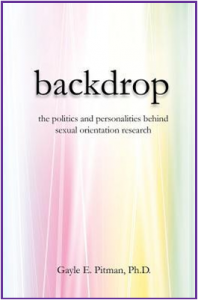 Backdrop: The Politics and Personalities
Backdrop: The Politics and Personalities
Behind Sexual Orientation Research
by Gayle Pitman
Active Voice Press
298 pages, $16.95 (paper)
THE SCIENCE of sexual orientation captures the interest of the American public, not just lesbians and gay men. Ever since the spate of articles on “gay twins,” the “gay gene,” and the “gay brain” in the 1990’s, research on the determinants of sexual orientation—or even gay-associated biological traits such as finger length, fingerprint patterns, inner ear clicks, etc.—have attracted tremendous press. Some of the original researchers, such as geneticist Dean Hamer, neuroscientist Simon LeVay, and psychologist J. Michael Bailey, have done an excellent job of reviewing this research and making the case for the biological basis of sexual orientation.
Vernon Rosario is an associate clinical professor in the Department of Psychiatry at UCLA and publishes on GLBTI psychosexual development and the history of psychiatry.






